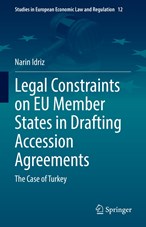[New book] Legal constraints on EU member states in drafting accession agreements: The case of Turkey
Published 7 July 2022
@shutterstock. European parliamennt.
Do Member States of the EU have a free hand in drafting accession treaties, or are there legal constraints on their primary law-making powers in this regard? In her recently published book ‘Legal constraints on EU member states in drafting accession agreements: The case of Turkey’, T.M.C. Asser researcher Narin Idriz argues that there are constraints and she seeks to identify them. Her findings also shed light on the possible limits to differentiated integration and could have important implications for future treaty amendments.
EU law-based constraints identified The aim of this book is to identify whether there are EU law-based constraints on Member States as primary law makers. To do this, three sources of EU law are examined: EEC-Turkey association law, EU enlargement law and the constitutional foundations of the union. This book uses the proposed permanent safeguard clause (PSC) on the free movement of persons in the Negotiating Framework for Turkey as the point of departure. Narin offers a closer analysis of the accession process by examining the evolution of Article 49 of the Treaty on the European Union (TEU), past practice and the role of Union institutions.
The aim of this book is to identify whether there are EU law-based constraints on Member States as primary law makers. To do this, three sources of EU law are examined: EEC-Turkey association law, EU enlargement law and the constitutional foundations of the union. This book uses the proposed permanent safeguard clause (PSC) on the free movement of persons in the Negotiating Framework for Turkey as the point of departure. Narin offers a closer analysis of the accession process by examining the evolution of Article 49 of the Treaty on the European Union (TEU), past practice and the role of Union institutions.
The book identifies procedural and substantive constraints on member states when they act within the context of the enlargement process. These constraints can be attributed to the wording of Article 49 TEU, which provides the main contours of the process, established practice and the principles of negotiation that were consistently applied in every subsequent accession wave. Overall, the findings of this book can be applied to the accession process of any candidate state.
Learn more and get the book on the publisher’s website.
About Narin Idriz Dr. Narin Idriz/ Tezcan is a researcher at the T.M.C. Asser Institute within the strand “Transnational public interests: constituting public interest beyond and below the state”. Narin has Master degrees in International Human Rights Law (Essex University) and European Business Law (Leiden University). She worked as a PhD fellow at the Europa Institute of Leiden University where she defended her thesis in May 2015. Narin’s research areas of interest are EU external relations, EU-Turkey association law, enlargement law, protection of fundamental rights in the EU in general, and the rights of Third Country Nationals in particular, and last but not least, EU asylum and migration law and policies.
Dr. Narin Idriz/ Tezcan is a researcher at the T.M.C. Asser Institute within the strand “Transnational public interests: constituting public interest beyond and below the state”. Narin has Master degrees in International Human Rights Law (Essex University) and European Business Law (Leiden University). She worked as a PhD fellow at the Europa Institute of Leiden University where she defended her thesis in May 2015. Narin’s research areas of interest are EU external relations, EU-Turkey association law, enlargement law, protection of fundamental rights in the EU in general, and the rights of Third Country Nationals in particular, and last but not least, EU asylum and migration law and policies.
